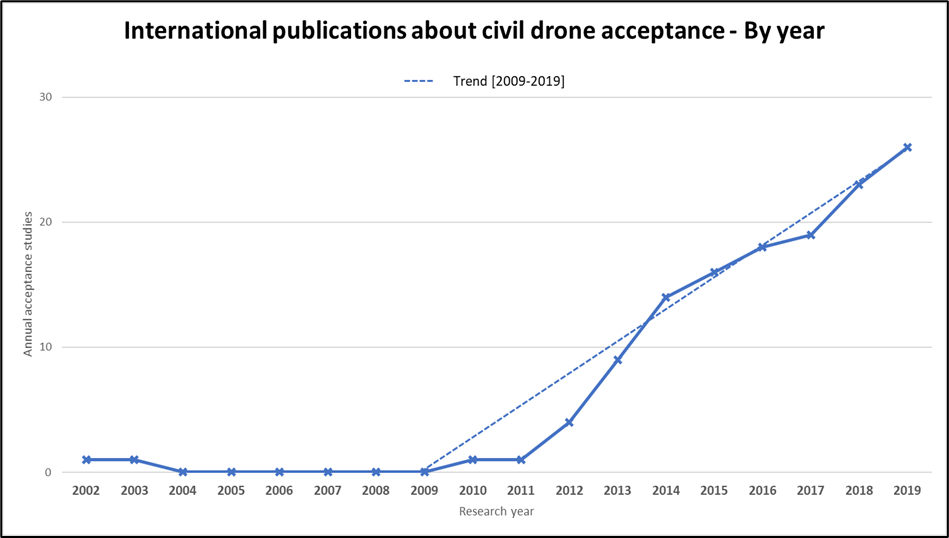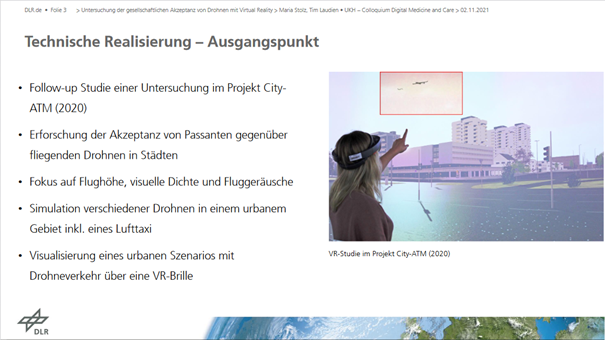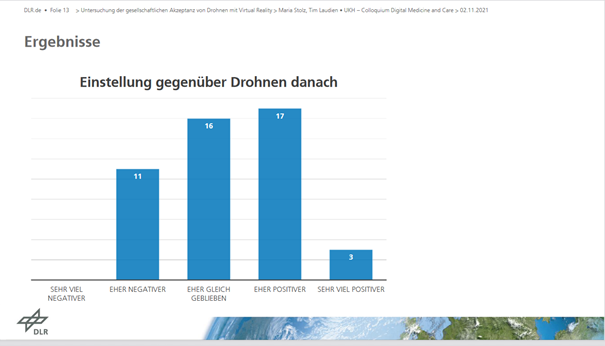Drone Acceptance – Results of Current Studies
By bruchmann
23. March 2022
AIRlabs Austria is the Austria-wide BMK innovation laboratory for the development and operation of test infrastructures for unmanned aerial systems. With its strong partner network, AIRlabs Austria enables an innovative infrastructure landscape with the associated expertise. In addition to the possibilities for testing unmanned aerial systems, AIRlabs also considers drone acceptance, among other things, in its holistic approach.
Civilian Perception of Drones – A Review of the Current Situation
In this context, a high-level expert discussion on drone acceptance was held in summer 2021. In addition to AIRlabs, the Austrian drone industry (Schiebel Elektronische Geräte GmbH, FACC AG, Frequentis AG) was represented as well as research and science (DLR, FH Kärnten, FH Joanneum). The starting point was the fundamental question of whether, despite hundreds of drone acceptance surveys (Figure 1) worldwide, we already know enough about aspects of drone acceptance to be able to derive very specific recommendations for action for Austria.

The results of the GARDA study with survey data primarily from the fourth quarter of 2019 (https://open4aviation.at/de/publikationen/GARDA.php) were also taken into account as a starting point.
Opportunities to increase drone acceptance
In the introductory part of the expert:inside discussion, it very quickly became clear that drones, as a relatively new disruptive technology, are generally still viewed very negatively or at least very cautiously and suspiciously. Dr Anne Papenfuß – as guest speaker of the German Aerospace Center (DLR) for Flight Guidance and proven expert for drone acceptance surveys – impressively detailed the challenges of collecting robust acceptance data. She presented various survey formats. During an initial telephone survey on various fields of application, it became clear that a large part of the population has had little personal experience and contact with drones so far and therefore concerns, fears and resentments are projected into this technology. Scientifically more elaborate and validated methods, such as the expansion of the methodological approach including virtual reality (VR), workshops and focus groups, provide much more tangible statements. Ms Pappenfuß then presented the DLR internal project “HorizonUAM” and some selected results from it. A comprehensive presentation of the scientific methods and selected results of the study on the social acceptance of drones with virtual reality are summarised in https://elib.dlr.de/145732/1/VR-Studie%20HorizonUAM_Kolloquium%20Uni%20Halle.pdf

A more detailed list of HorizonUAM publications is available from DLR at https://www.dlr.de/fl/desktopdefault.aspx/tabid-18246/29007_read-76340/
It is remarkable that by supporting the survey situation with simulation and VR alone, the drone acceptance value is about 10% higher in total compared to a pure telephone or questionnaire survey. Much more precise aspects of drone acceptance, such as flight altitude, noise, trajectory, number of UAVs, etc., can also be extracted from such studies. According to Papenfuß, “this is how you really get to know what bothers people about UAVs”.

AIRlabs as enablers for future drone acceptance
In the subsequent brainstorming session of the expert:inside discussion, the need to keep the topic of UAVs positively discussed in Austria was established. To this end, a whole mix of measures was necessary; specifically addressed were:
- Topic presence, media presence, education for topics such as search and rescue missions, outpatient flights, provision of medicine, etc.
- An honest cost-benefit assessment and the associated sustainability consideration.
- The need for demo and pilot applications, especially in the innovative AIRlabs infrastructure and airspace restriction areas.
- The importance of high-tech knowledge for the population and the arguments of associated highly qualified jobs in Austria.
- A clarification that UAVs must also adhere to very clear laws.
AIRlabs can play a key role in filling a “storybook” of successes and useful applications of UAVs in Austria and presenting it to the public.
AIRlabs Austria is available at office@airlabs.at for questions and comments on the results of this expert discussion on drone acceptance in Austria and will continue to consider this topic as part of its funding programme activities.

